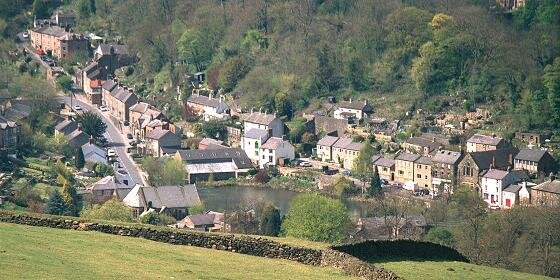| CROMFORD VILLAGE IN DERBYSHIRE DERWENT VALLEY MILLS WORLD HERITAGE SITE |
|
|
|
Cromford is a village in the county of Derbyshire in the East Midlands of England, on the southern edge of the Peak District. It has a population of 1,669 (in 1991). Situated just off the A6 trunk road, the village is 17 miles north of Derby, and about 20 minutes drive from the M1 motorway. The nearest towns are Matlock and Wirksworth. Cromford is well known through its connection with Sir Richard Arkwright, who established a water powered cotton spinning mill here in 1771. |
|||
| Cromford is set in a valley, surrounded by wooded hills and cliffs, bordered by the River Derwent to the east and vast quarries to the west. There are many paths and trails giving extensive views of the village and beyond. Cromford is a sturdy, stone built village, cut through by the busy Cromford Hill road and the A6. Although at first sight not a 'pretty' village, it has a charm of its own, with much to surprise and please the visitor. Some cottages and farm buildings pre-date Arkwright's time, but a large part of the village was built to house the mill workers. They were provided with shops, pubs, chapels and a school. The 20th century saw the development of council and private housing, while the growth of Dene Quarry changed the face of Cromford for ever. |
|||
|
In recent years Cromford has lost some of its long standing traditions and familiar landmarks have changed. The Carnival and fair are no longer held. The Cromford Steam Rally, originally held on Cromford Meadows, now takes place at Brackenfield, although still retaining its name. The Masson Mill in Matlock Bath, which provided employment for many Cromford people, closed and is now a shopping village and museum. The Blacksmith's shop on the Market Place re-opened in 1999 as three separate units, while Howards Bakery closed on March 31st 2006, and has been converted to shops and flats. Cromford Mill was last in use as a Colour Works, but is now a Visitor Centre owned and run by the Arkwright Society, with a variety of shops and businesses occupying the old buildings. "Celebrating Cromford", a weekend festival celebrating the village and the talents of the people who live here, started in June 2005 and has become an annual event. In December 2001 a 15 mile corridor from Masson Mill in Matlock Bath to the Silk Mill in Derby and including the mills in Cromford, Milford, Belper and Darley Abbey was declared the Derwent Valley Mills World Heritage Site after the Government's nomination of the area to UNESCO for World Heritage status was approved in Helsinki. Cromford is also on the route of the Derwent Valley Heritage Way, which was officially opened by the late Duke of Devonshire on 3 April 2003. Please email Yvonne Daykin if you have any comments or additions to the site.
© 2001 - 2014 Yvonne Daykin. Cromford village website launched 3 June 2001. Updated 27 November 2014 ^Back to the top |
